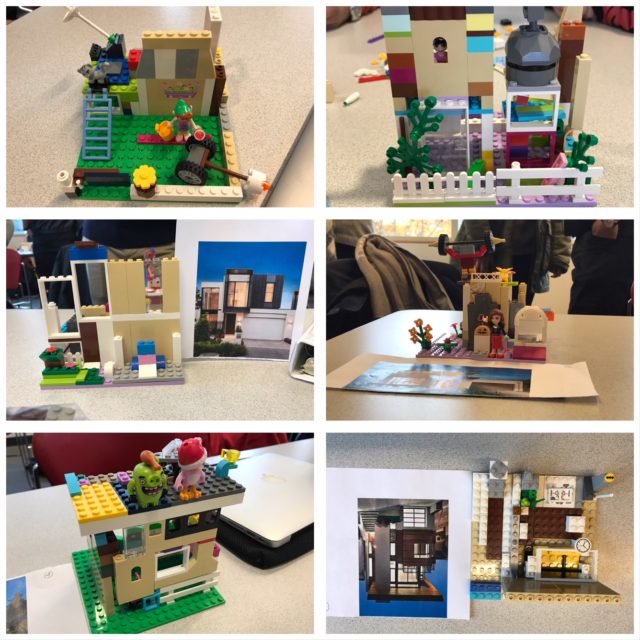Exceeded Expectations

Week 9 – EDUC471D100 – November 3, 2017
Today’s topic was growth mindset… and today’s warm-up activity exemplified that. What an awesome challenge. Using LEGO is an outstanding vehicle for students to exercise and develop their core competencies of thinking, communication, and personal/social. The challenge? Build a LEGO structure that resembles the picture given. I did not even realize that each picture was different. Students were sub-divided into teams of 4-5 and off they went. The student facilitator prepped this activity so that each bag of LEGO had some very challenging pieces. It was student engagement at its finest. A 10-minute activity turned into a 30-minute activity. We ended the activity doing MUSEUM where students had the opportunity to “show off” their house designs. Overall, it was amazing!!!
Journal Reflection Responses
Would you consider yourself to have a fixed mindset or growth mindset? Give examples as to why you think so.
- I really, really would like to think that I have a growth mindset… but I find myself at times that I might not. Take today’s class for example… I have an expectation as to how things will go and I am always surprised and delighted to learn what you have learned. I love what we achieve as a class and I cannot believe how this class exceeds my expectations every week. This class helps me realize what’s possible. I guess that might resemble a growth mindset. Admittedly, I had that dark feeling while doing my dissertation or anything I thought I could not do… by saying “I can’t” (which, BTW is different from saying “I won’t”). “I can’t” provokes me to try. OH YES I CAN… but it’s about patience and kindness… with passion and perseverance… I CAN.
What are the advantages of having a growth mindset?
- You won’t be limited by what you perceive you cannot do. ANYTHING IS POSSIBLE. That’s been my mantra… during municipal elections, as a secondary mathematics teacher, and as a learner/researcher. Who know’s what’s possible unless you try. Last night, I co-moderated #bcedchat on Twitter with my colleague and friend @tracycramer. The chat was about TAKING THE LEAP. It was about risk-taking, learning, and making mistakes. We need to model what we want to see. Anything is possible, if we want it to be. The “fixed mindset” limits people and creates an unnecessary struggle. An early acceptance of what is, is not good enough. The joy comes from the challenge and achieving what you set out to do. You may not know the outcome but maybe when things don’t work out, that’s the learning too.
How does having a growth mindset influence the implementation of BC’s New Curriculum?
- BC’s New Curriculum is about possibilities. Teachers, administrators, policy makers, parents, and students need to realize this as a collective… and not in isolated pockets. The more I implement the ideals of BC’s New Curriculum in the courses I teach at SFU, I am heartened. Personalized learning, formative assessment, competencies-based curriculum, student-led learning, First Peoples Principles of Learning… need an open-mind and flexibility to realize what’s possible to create a kind of student achievement I have never witnessed before. Students are not motivated by “marks” or “grades”… they are motivated by their own learning and interests. Student choice is key to student empowerment. Students take ownership of their learning and learning more about their learning. Metacognition is a gift so that students can realize their strengths, what they need to work on, and what they enjoy learning.
MY REFLECTION
I love the idea of Carol Dweck’s concept of the Growth Mindset and “not yet.” My class is getting their groove in this course. Reporting out on this week’s reading, student derived discussion questions, and small group discussions are almost seamless. Students reporting out what was discussed is succinct and thought-provoking. As mentioned, the student-led learning activities are amazing and aligned to what we are learning. Furthermore, my journal questions that I pose to students closely resemble the discussion questions, which makes be believe that my students and I are aligned. We all have roles in this class and as a group… We’re exceeding my expectations. It can only get better.
Practice what you preach. Not only am I curious as a learner/teacher about the potential of BC’s New Curriculum, I want to model what I want to see. What is 21st Century Learning? Let’s not just read about it, let’s do it. I am so glad that I have students who are willing to play along with me to realize what’s possible. I’m getting feedback now that students are amazed how the class is unfolding. It’s engaging and they look forward to this class. One student said that they were glad that they get this course on Friday to end their week on a high note. Wow. Thanks! I will take that compliment. I love the litmus… Do you teach the class in a way that students will want to buy tickets to go to it?
To take this modelling a bit further, we did not complete what I had planned to do today. Carol Dweck’s NOT YET. We were on time before the break with the warm-up activity, reading reflections, and small group discussion. After the break, we were learning how to develop curriculum by co-creating draft curricular competencies for the course in the context of their final paper/unit plan. Our final assignment models BC’s New Curriculum and I wanted students to compose their own curricular competencies to be evaluated on. This is not an easy task. Curriculum writing teams took weeks to accomplish this. I gave them 30 minutes. As it turned out, it took longer than expected. I had a choice. Stop their learning and engagement OR move on with my lesson plan. Meh. Post-pone the closing student-led learning activities and continue with what we were doing. They were making good progress and it took time to wrap our minds around the task. We will get there.